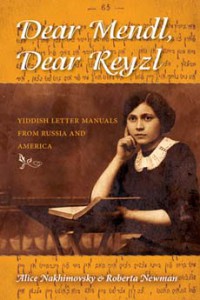How to Live a Paper Life: Yiddish Letter Manuals from Russia and America
 Say you're a woman living in a shtetl in 1900: what do you say in a letter to your husband in America if you think he's cheating on you? What about to your son to express your disapproval of how he's been letting his schoolwork slide in favor of hanging out with a bad crowd? Or how about to a friend to express your shock over the fact that you've heard he has a Christmas tree in his Jewish home?
Say you're a woman living in a shtetl in 1900: what do you say in a letter to your husband in America if you think he's cheating on you? What about to your son to express your disapproval of how he's been letting his schoolwork slide in favor of hanging out with a bad crowd? Or how about to a friend to express your shock over the fact that you've heard he has a Christmas tree in his Jewish home?
These are sort of letters that Alice Nakhimovsky and Roberta Newman translated for their book Dear Mendl, Dear Reyzl: Yiddish Letter Manuals from Russia and America (Indiana University Press, 2014) and which they will present at YIVO on June 17, 2014 at 7:00pm. If you were a Jew in Russia or Poland or a new Jewish immigrant to America in the late nineteenth to early twentieth century and facing these and other dilemmas, you might find yourself turning for help to a brivnshteler, a Yiddish letter manual.
 Alice Nakhimovsky
Alice NakhimovskyBrivnshtelers had fictional letters for all kinds of situations and included family letters, business letters, and even love letters. People read them to get an idea of what proper letters were supposed to look and sound like and also as entertainment in an era in which there was very little to read in Yiddish. “The original title of our book was ‘How to Live a Paper Life’,” Newman notes. “These books were popular in an era of mass migration, when people found themselves increasingly likely to be separated from loved ones. There was even an expression: ‘Now we have to live a paper life.’ But people didn’t really know how to write letters and sometimes could barely even write in Yiddish.”
 Roberta Newman
Roberta NewmanThe evening will begin with readings of letters from the book by actors Yelena Shmulenson and Allen Lewis Rickman and continue with a conversation with the authors moderated by Queens College professor Elissa Bemporad.
Attend the event.
Buy the book.
Listen to an interview with authors on Vox Tablet.
Read a review of the book by the Jewish Book Council.
Read a review of the book in the Yiddish Forverts.